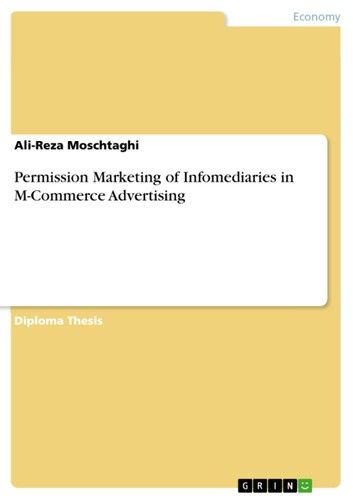Diploma Thesis from the year 2002 in the subject Business economics - Marketing, Corporate Communication, CRM, Market Research, Social Media, University of Cologne (Media Management), 87 entries in the bibliography, language: English, abstract: 1INTRODUCTION The expectations for M-Commerce are very high. The mobile user seeks for facilitation of his daily habits and companies anticipate generating high revenue stream through new mobile applications. After telecommunication companies have paid high prices for the UMTS licenses in Europe M-Commerce has started to be the new hype. In those countries which did not have auctions but beauty contests M-Commerce has been also shifted into the spotlight. Although M-Commerce is still in its infancy, it predicts to have a huge impact on many ways of people's lives. New buzz words like anywhere and anytime have evolved in order to describe the great potential of M-Commerce. Growth opportunities in terms of new arising mobile business models seem promising but only the future will be able to answer the question of success. Mobile devices offer a broad range of opportunities from entertainment service e.g. music, games or video up to transactions e.g. banking, shopping, auctions. It is still unclear if all the emerging opportunities can be commercialized successfully. Nevertheless, many scenarios of how the world could be like in the future have been made. Below an excerpt of the daily routine of a future mobile user is presented: (For following paragraphs see Ovum 2000(b), p. 23-24) 'Nancy D`Amato prepares to leave her office just before five o'clock. She uses her mobile phone for a quick check of the local weather forecast, sees that fines conditions are expected for the evening, and decides to leave her umbrella by her desk. Nancy is due to meet her boyfriend Peter at seven o' clock, so she has two hours in town to waste. As soon as the clock reaches five, she receives a text message telling her that the bar across the street has a 'happy hour' when drinks are cheaper. Nancy deletes the message almost without reading it. She has given her mobile service provider permission to send her unsolicited local promotional messages after five - otherwise she would have to pay a higher subscription rates - but that does not mean she actually has to read the message, does it? Five minutes later another message arrives, with a coupon offering a discount at the local branch of her favorite coffee bar. She shows the coffee-shop attendant the numbered message on her phone's screen, and he keys in the number on the till when charging for the coffee. [...]











